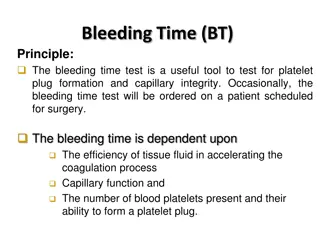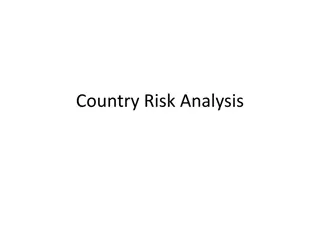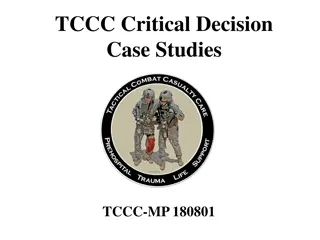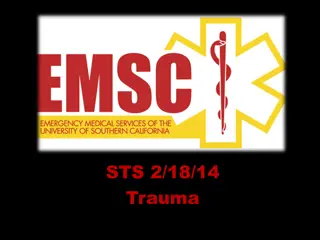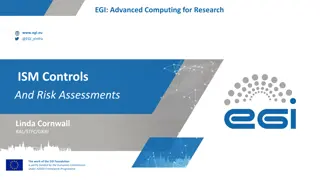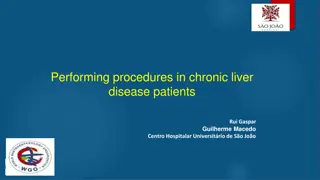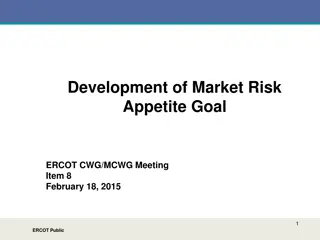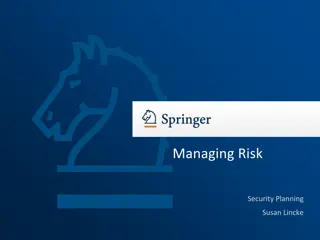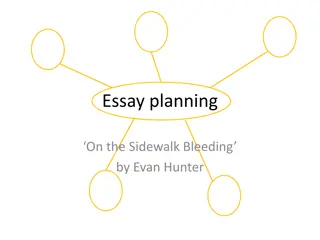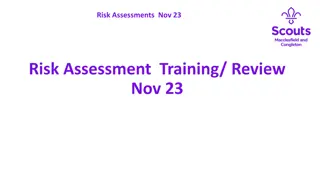fibroids-and-fertility-what-you-need-to-know-
Worried about fibroids impacting your baby\u2019s dreams? Millions of women face the challenging reality of uterine fibroids. Female factor infertility can occur due to many reasons. It is highly important to regularly observe one\u2019s reproductive health. Many women of young age have issues relat
1 views • 6 slides
Understanding Risk Management in Environmental Geography and Disaster Management
Risk management in environmental geography and disaster management involves assessing the potential losses from hazards, evaluating vulnerability and exposure, and implementing strategies to mitigate risks. It includes calculating risk, dealing with risk through acceptance, avoidance, reduction, or
1 views • 10 slides
Ticagrelor Monotherapy vs. 12-Month Dual Anti-Platelet Therapy After Coronary Stent Implantation for ACS
The study compares the efficacy of ticagrelor monotherapy after less than 1 month of dual anti-platelet therapy (DAPT) to 12-month ticagrelor-based DAPT in patients with acute coronary syndrome (ACS) undergoing percutaneous coronary intervention (PCI) with drug-eluting stent implantation. The aim is
1 views • 19 slides
Introduction to Flood Risk Assessment with HEC-FDA Overview
This presentation delves into flood risk assessment using HEC-FDA software, covering topics such as defining flood risk, components of uncertainty, consequences of flood risk, and methods to assess flood risk including hydrology, hydraulics, geotechnical, and economics. It explores the intersection
6 views • 39 slides
Risks and Strategies for Safe Caesarean Deliveries in South Africa
Understanding the mortality burden related to caesarean deliveries (CD) in South Africa, this report highlights the need for safe CD practices amidst high maternal death rates. Factors influencing safe CD, checklists for accreditation, and strategies for action plans are discussed. The Case Fatality
0 views • 40 slides
Understanding Bleeding Time and Coagulation Time Tests
The Bleeding Time (BT) test evaluates platelet plug formation and capillary integrity, crucial for surgery preparations. Prolonged bleeding times indicate low platelet count or dysfunction. The Duke method is one way to determine Bleeding Time. Sources of error, such as medication interference, impr
5 views • 8 slides
Understanding Heavy Menstrual Bleeding: A Comprehensive Overview
A detailed exploration of heavy menstrual bleeding (HMB) by Consultant Gynaecologist Mary Connor, highlighting its impact on women's health and well-being. The importance of early investigations, treatments, and referrals, as well as key considerations for women with obesity or estrogen imbalances.
4 views • 34 slides
Understanding Country Risk Analysis in International Business
Country risk analysis is crucial for multinational corporations (MNCs) to assess the potential impact of a country's environment on their financial outcomes. It includes evaluations of political and economic risks in foreign operations. Sovereign risk, political risk characteristics, and factors are
1 views • 61 slides
Understanding Blood Groups, Clotting Time, and Bleeding Time in Medical Practice
This informative material delves into the significance of determining blood groups, clotting time, and bleeding time in medical settings. From explaining the ABO and Rhesus systems to outlining the practical objectives and procedures for the assessments, this resource aims to enhance understanding o
0 views • 34 slides
Project Risk Management Fundamentals: A Comprehensive Overview
Project risk management involves minimizing potential risks and maximizing opportunities through processes such as risk management planning, risk identification, qualitative and quantitative risk analysis, risk response planning, and risk monitoring and control. Quantitative risk analysis assesses t
0 views • 41 slides
Understanding Uterine Cancer and Postmenopausal Bleeding
Dr. Khalid Akkour, Assistant Professor of Gynecologic Oncology at King Saud University Medical City, provides insights on uterine cancer and postmenopausal bleeding. The structured OSCE discusses important aspects such as taking a focused history, age, ethnicity, past gynecologic and obstetric histo
0 views • 154 slides
TCCC Critical Decision Case Studies: Bleeding Management Scenario
This presentation focuses on a critical decision case study in Tactical Combat Casualty Care (TCCC) involving a casualty with high amputations and ongoing massive hemorrhage. The scenario explores the challenges of managing uncontrolled bleeding in a combat situation and provides insights into the r
0 views • 139 slides
Bleeding Risk Estimation and New BARC Definition Overview
This presentation discusses the significance of bleeding as a clinical endpoint in the context of antithrombotic therapy, emphasizing the association between increased bleeding risk and adverse clinical outcomes. It explores hypothetical mechanisms linking bleeding events to mortality and the constr
1 views • 20 slides
Emergency Management of Massive Blood Loss: A Case Study
This case study details the emergency management of a 72-year-old female patient with massive blood loss due to esophageal varices, providing insights into assessment, resuscitation, and treatment strategies to stop bleeding, replace losses, and prevent worsening. Key considerations include the prin
0 views • 31 slides
Life-saving Intervention with Celox: Real-life Examples and Success Stories
Learn about the life-saving impact of Celox in critical situations such as life-threatening bleeding, blast injuries, and gunshot wounds. Real-life cases highlight how Celox effectively stops bleeding, stabilizes patients, and enables transfer to hospitals, showcasing its crucial role in emergency m
0 views • 33 slides
Treatment Strategies for Hemorrhagic Stroke: Goals and Management
Short-term goals for treating hemorrhagic stroke involve rapid neurointensive care to maintain adequate oxygenation, breathing, and circulation, along with managing increased intracranial pressure and blood pressure. Long-term management focuses on preventing complications, recurrent bleeding, delay
11 views • 9 slides
Evaluation of Risk Stratification Schemes for Ischaemic Stroke and Bleeding in Atrial Fibrillation Patients
A study conducted in Sweden on 182,678 patients with atrial fibrillation aimed to investigate risk factors for stroke and bleeding. The research assessed the application of CHA2DS2-VASc and HAS-BLED schemes for stroke and bleeding risk evaluations. Data from the Swedish Atrial Fibrillation cohort st
0 views • 20 slides
Comparing Bleeding and Mortality Risks of Dabigatran vs. Rivaroxaban in Elderly Medicare Beneficiaries
A study by DJ Graham et al. compared the risks of stroke, bleeding, and mortality in elderly Medicare beneficiaries with nonvalvular atrial fibrillation treated with dabigatran or rivaroxaban. The study included over 118,000 patients and found that dabigatran was associated with a lower risk of majo
0 views • 9 slides
First Aid Tips for Common Trauma Injuries
Learn how to manage various trauma injuries such as skull fractures, eye injuries, blowout fractures, epistaxis, mouth injuries, soft tissue injuries, open injuries, and penetrating wounds with practical first aid techniques. From treating bleeding and impaled objects to saving dislodged teeth and c
0 views • 16 slides
Understanding Risk Concepts and Management Strategies in Finance
Explore the essential concepts of risk in finance, such as risk definition, risk profiles, financial exposure, and types of financial risks. Learn about risk vs. reward trade-offs, identifying risk profiles, and tools to control financial risk. Understand the balance between risk and return, and the
0 views • 18 slides
Risk and Return Assessment in Financial Management
This comprehensive presentation explores the intricacies of risk and return assessment in the realm of financial management. Delve into understanding risk concepts, measuring risk and return, major risk categories, and the impact of risk aversion on investment decisions. Gain insights into the manag
0 views • 62 slides
Risk Management and Security Controls in Research Computing
The European Grid Infrastructure (EGI) Foundation conducts risk assessments and implements security controls in collaboration with the EOSC-hub project. The risk assessments involve evaluating threats, determining likelihood and impact, and recommending treatment for high-risk threats. Results from
0 views • 13 slides
Risk Management & MPTF Portfolio Analysis at Programme Level for UN Somalia
This session delves into the world of risk management and portfolio analysis at the programme/project level, specifically focusing on the Risk Management Unit of the United Nations Somalia. It covers enterprise risk management standards, planned risk management actions, the role of RMU, joint risk m
0 views • 30 slides
Alcohol and Cancer Risk: Understanding the Links
Alcohol consumption is linked to an increased risk of various cancers, including mouth, throat, esophagus, breast, liver, and colorectal cancers. Factors such as ethanol, acetaldehyde, nutrient absorption, estrogen levels, and liver cirrhosis play a role in this risk. Even light drinking can elevate
0 views • 17 slides
Understanding Epistaxis: Causes, Sites of Bleeding, and Management
Epistaxis, commonly known as nosebleed, can range from trivial to life-threatening. It can result from various local and general causes, including idiopathic bleeds, trauma, inflammatory conditions, neoplastic growths, and systemic diseases. Understanding the vascular anatomy and sites of bleeding i
0 views • 23 slides
Understanding Risk Concepts in the Mathematics Classroom
Risk is a concept integral to decision-making in various aspects of life. This resource explores how risk is defined in the real world, its relevance in the classroom, and strategies for teaching risk literacy to students. It delves into the multiple definitions of risk, risk analysis, and the emoti
0 views • 62 slides
Comprehensive Guide to Abnormal Uterine Bleeding: Causes, Approach, and Management
Explore the approach to abnormal uterine bleeding in general practice with Dr. Lubna Qayam. Dive into different scenarios of patients presenting with varied symptoms and histories. Learn about the causes of abnormal uterine bleeding in reproductive age and post-menopausal women, including anovulator
0 views • 22 slides
Ticagrelor Monotherapy vs. Ticagrelor + Aspirin in High-Risk PCI Patients: TWILIGHT-COMPLEX Study
Patients undergoing complex PCI are at high risk of ischemic events. The TWILIGHT-COMPLEX study aims to compare the safety and efficacy of ticagrelor monotherapy versus ticagrelor with aspirin in patients who completed 3 months of DAPT post-PCI. While extended DAPT may reduce ischemic events, it als
0 views • 27 slides
Procedures in Chronic Liver Disease Patients During COVID-19
COVID-19 poses challenges to healthcare services, requiring a balance between minimizing viral spread and providing quality care. Endoscopy in chronic liver disease patients must consider SARS-CoV-2 transmission risks. Specific procedures like endoscopic band ligation and ERCP are indicated based on
0 views • 6 slides
Management of Lower GI Bleeding: Initial Evaluation and Resuscitation
Lower gastrointestinal bleeding, originating distal to the ligament of Treitz, often presents with overt or occult symptoms. Initial management involves hemodynamic stabilization, localization of the bleed site, and tailored therapeutic interventions. Key steps include IV fluid resuscitation, monito
0 views • 44 slides
Understanding Organizational Risk Appetite and Tolerance
Explore the development of market risk appetite goals and how to define and establish organizational risk tolerance. Learn about the Classic Simplified View of Risk Tolerance and different methods to determine risk appetite. Discover the importance of assessing market risk impact and aligning risk t
0 views • 8 slides
Developing a Risk Appetite Culture: Importance and Framework
Risk management plays a critical role in the success of corporations, with strategy and risk being intertwined. This presentation delves into definitions of key terms such as risk appetite, the Risk Appetite Cycle, characteristics of a well-defined risk appetite, and the importance of expressing ris
0 views • 31 slides
Security Planning and Risk Management Overview
This content provides an in-depth exploration of managing risk, security planning, and risk appetite in the context of cybersecurity. It covers essential concepts such as risk management process, threat types, risk analysis strategies, vulnerability assessment, and risk mitigation techniques. The ma
0 views • 73 slides
Case Discussion: Post-Menopausal Bleeding in a 65-year-old Woman
Mrs. Pauline, a 65-year-old woman presenting with post-menopausal bleeding for the past 4 months, without associated symptoms, history of recent weight changes, or hormonal therapy. Her menstrual and obstetric histories, along with past medical and surgical history, are significant. Further evaluati
0 views • 22 slides
Risk Factors Analysis: Identifying At-Risk Students Before They Reach Campus
Risk Factors Analysis aims to identify students at risk of attrition before they even arrive on campus by evaluating academic, financial, minority, and first-generation factors. The method involves choosing specific risk factors, tracking historical prevalence, calculating relative risk, and predict
0 views • 15 slides
Understanding Third Trimester Bleeding: Causes, Evaluation, and Management
Third trimester bleeding can be caused by various factors like placental abruption and previa, requiring prompt evaluation including assessing fetal heart rate and determining placental location. Different complications can arise for both the mother and fetus, necessitating specific management plans
0 views • 17 slides
First Aid for Controlling and Treating Bleeding and Injuries
Learn about how to handle and control bleeding, both internal and external, through first aid techniques including applying pressure bandages, using tourniquets, and recognizing signs of internal and external bleeding. Discover methods to assist victims and provide aid in various situations, such as
1 views • 18 slides
Analysis of Sympathy and Tragedy in 'On the Sidewalk Bleeding' by Evan Hunter
Explore the themes of sympathy, tragedy, and identity in "On the Sidewalk Bleeding" by Evan Hunter through the character of Andy, who struggles with a sense of belonging and recognition after a tragic incident. The essay delves into the societal pressures, personal aspirations, and ultimate fate of
0 views • 71 slides
Comprehensive Risk Assessment Training Overview
In this risk assessment training session held on November 23, participants reviewed the process of writing and reviewing risk assessments to enhance the quality of assessments for safer scouting experiences. The training aimed to improve leaders' skills and confidence in risk assessment practices wh
0 views • 37 slides
Emergency Management in Cardiac Intensive Care
Information on managing emergencies in cardiac intensive care including topics like hemorrhage post-cardiac surgery, tamponade post-cardiac surgery, and control of bleeding. Details on initial steps for bleeding control, teamwork in managing hemorrhage, and diagnosing tamponade post-cardiac surgery
0 views • 16 slides





